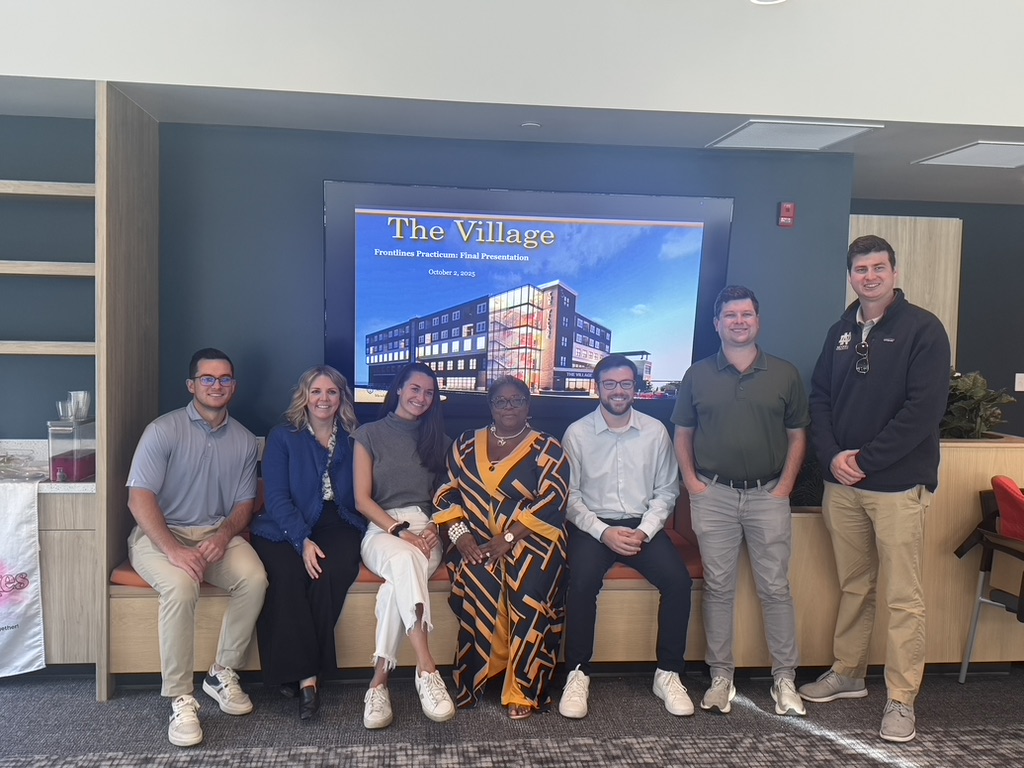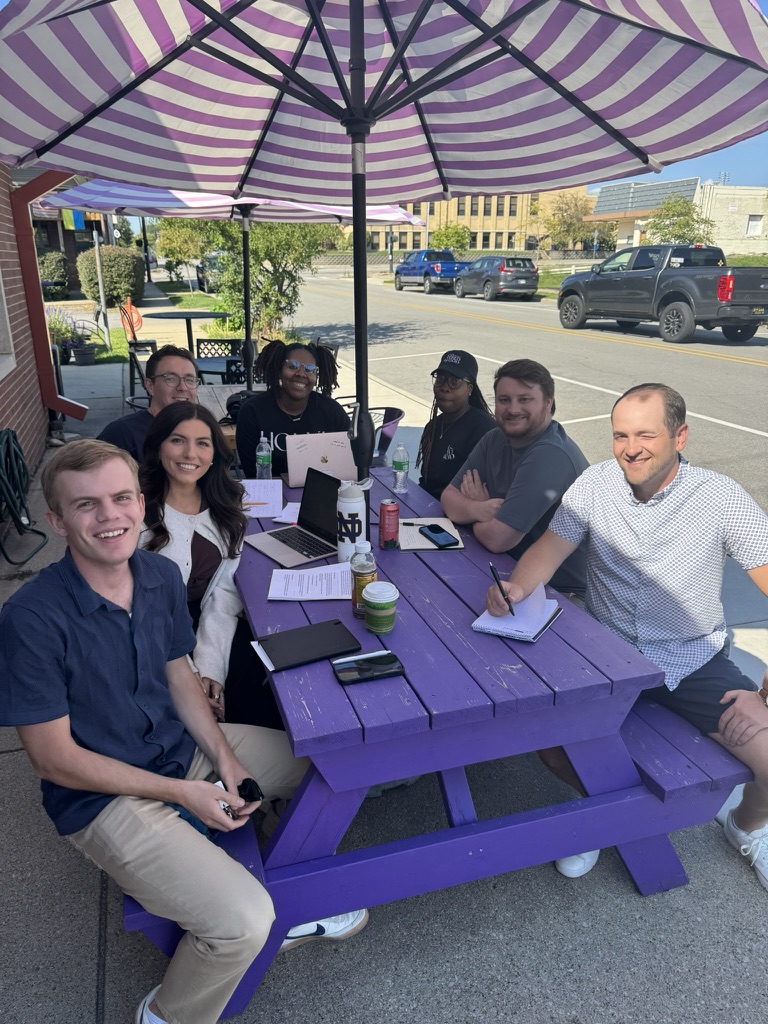
New Frontlines Practicum brings dynamic business solutions to Notre Dame’s neighbors.
When Kelly Rubey joined the faculty at the University of Notre Dame’s Mendoza College of Business in 2020, she had already supported a number of Meyer Business on the Frontlines projects in countries as far as Timor-Leste and Uganda. She saw that these projects were transformative, not just for the Notre Dame MBA and law students enrolled in the program’s flagship international course, but also for the communities that welcomed them.
Business on the Frontlines projects emphasize Catholic social teaching principles of subsidiarity and solidarity, taking a service-oriented approach to business problem-solving analysis and frameworks that empower community partners to bring their ideas to life.
Rubey launched the domestic Frontlines in America course soon after she started, which followed the international course’s tenets of using dynamic business skills to help communities struggling with issues like poverty, violence and barriers to economic opportunities. This fall, she is further localizing the Frontlines program with a new course, Frontlines Practicum: Local Impact.
“It's great to have an impact around the world and around the country,” said Rubey, the Edward J. Huether Associate Teaching Professor of International Business. “But I think it's important that we do that while also serving our neighbors who face similar challenges.”
Those neighbors include organizations spearheading the West Side revitalization project in South Bend, Indiana. The West Side has endured a long history of disinvestment, resulting in multidimensional poverty and exclusion from the city’s services and economic opportunities.
“It hits every part of life: education, housing, finances, what we eat, how we access services from the city — which we pay for. We've seen such a lack of all those things,” said Consuella Hopkins, a lifelong resident and owner of Consuella’s Accounting & Tax Firm. Hopkins is behind the ambitious project known as The Village, a $20 million community-powered development with a vision for a Black business and cultural district at the corner of Wilber Street and Lincoln Way West.
Not far from the Wilber node project, Jasmine Bradley launched Vegan Bites By Jas, which provided free cooking classes to the community alongside for-profit efforts to create education opportunities and provide free or low-cost meals. The success of Vegan Bites By Jas inspired her to create The Dream Collective, which is combating food security issues and obstacles to healthy living with farm boxes packed with produce grown on site. The collective also offers a business mentorship program for young entrepreneurs. Bradley’s long-term vision is to expand to a no-cost mobile grocery store and, eventually, a permanent hub with an affordable full-service grocery store, business training classrooms and a community wellness center.

“I know it’s going to be a game changer for the communities that we're serving,” said Bradley. “But we need support in getting from how we're serving the community right now to becoming that education space for food access and farming in the community.”
This is where the Frontlines Practicum offers support. During the seven-week course, students divide their time between classroom research and community immersion. For the initial course, one student group accompanied Hopkins and The Village while the other teamed up with Bradley at the Dream Collective.
The classroom component builds both analytical and creative business problem-solving skills through McKinsey Consulting’s seven-step framework while preparing students for trauma-informed and culturally sensitive ethnographic research. The two groups also share new insights and ideas gleaned from their community work since they are working to solve interconnected challenges in the same community.
“I'm really looking forward to having other educated, mindful people look at this and have something tangible that we can move forward with,” Hopkins said at the beginning of the course, adding that she is glad the projects inform one another. “They’re definitely intertwined. I mean, that's what community is.”
Bradley said that by focusing the Dream Collective on something as critical as accessing healthy food, the organization is naturally tied to the various businesses Hopkins is investing in at the Wilber node.
“Our goal is to take a basic need for food and create economic sustainability,” said Bradley. “We're not just teaching people how to grow food, we're also teaching them how to supply it.”
Throughout the course, the Dream Collective team applied an “access, quality and usage” framework to the issue of food security in South Bend.
“What we learned through this approach is that there are two primary unmet needs in our community: access to a full-service grocery store and lack of education around cooking and consuming healthy foods,” said Rubey. “Multiple grocery stores have left the West Side in recent years. This paired with limited access to transportation has led to an extreme food desert.”
Rubey explained that, while several nonprofit organizations are working to address the food desert issue, education is still lacking. For example, students noted an interview with a community member at a food bank who received an eggplant, but had no idea how to incorporate it into a meal.
The team focused on the unique strengths of Bradley’s Dream Collective to identify short-term opportunities for impact around education and healthy eating. “The students gave us real, actionable insight into how we can use our strengths to not only address food access but also collaborate with others who are working toward the same goal,“ said Bradley. “This experience has been truly priceless. It has expanded my vision, helped our organization grow and deepened the way we serve our community. Out of all the partnerships I’ve had in my six-plus years in business, this one has definitely been one of the most transformative.”
The Village team also combined rigorous research on multistakeholder, community-driven cooperatives while conducting over 60 interviews with local community members to understand not just their challenges but their aspirations for the community.
“This project could be a collaborative power base uniting the community to come together to demand revitalization, to write our own story and to build something that represents us and gives us hope.”
South Bend community member
One thing the students heard many times that informed their final recommendation was the need for a safe place for belonging, empowerment, safety and healing. As one community member explained, “This project could be a collaborative power base uniting the community to come together to demand revitalization, to write our own story and to build something that represents us and gives us hope.”
“The students helped shape a model of what’s possible when inclusion, collaboration and compassion guide every decision,” said Hopkins. “Together, we’re building a future where revitalization strengthens the roots of the people who already call this community home.”
The projects went by quickly, but Rubey plans to continue the momentum with ongoing campus collaborations and future courses. To help facilitate this is the University’s Institute for Social Concerns where Regina Williams-Preston, the community partnerships program director, identified The Village and Dream Collective as partners for the inaugural course.
“Regina's work connecting with small business owners on South Bend's West Side demonstrates a community-driven approach to collaboration rooted in Catholic social tradition's emphasis on participation and subsidiarity, enacting the focus of the University's strategic framework on South Bend and the local region,” said Suzanne Shanahan, the Leo and Arlene Hawk Executive Director at the Institute.
Rubey added that working in community engagement with organizations like The Village and Dream Collective is a unique opportunity and great privilege for Mendoza faculty and staff, as well as MBA and law students.
“Not to mention it’s just a great learning experience,” said Rubey. “If you can figure out how to structure an ambiguous problem optimizing both social and financial returns like the ones we're dealing with here, then when you go into the corporate world, it almost makes everything else look easy.”